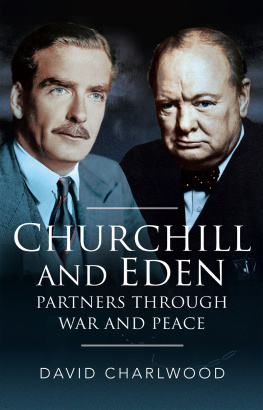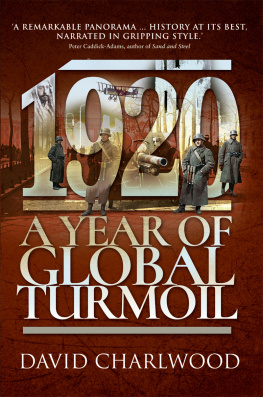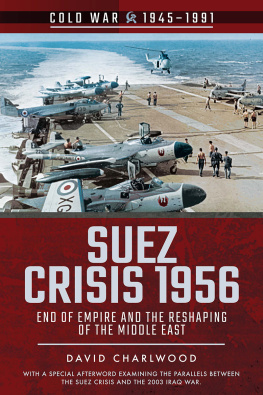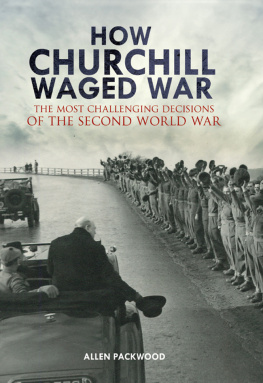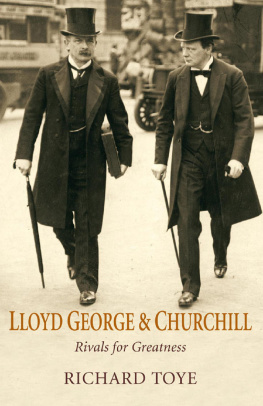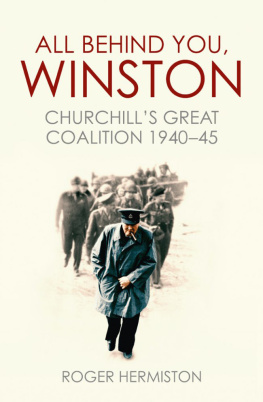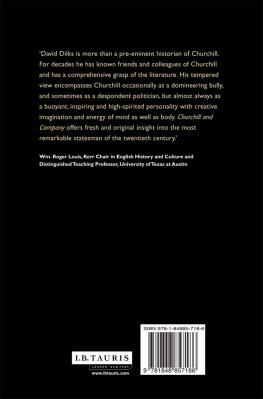Pagebreaks of the print version

CHURCHILL AND EDEN
PARTNERS THROUGH WAR AND PEACE
CHURCHILL AND EDEN
PARTNERS THROUGH WAR AND PEACE
DAVID CHARLWOOD
First published in Great Britain in 2020 by
PEN AND SWORD HISTORY
An imprint of
Pen & Sword Books Ltd
Yorkshire Philadelphia
Copyright David Charlwood, 2020
ISBN 978 1 52674 489 0
eISBN 978 1 52674 490 6
Mobi ISBN 978 1 52674 491 3
The right of David Charlwood to be identified as Author of this work has been asserted by him in accordance with the Copyright, Designs and Patents Act 1988.
A CIP catalogue record for this book is available from the British Library.
All rights reserved. No part of this book may be reproduced or transmitted in any form or by any means, electronic or mechanical including photocopying, recording or by any information storage and retrieval system, without permission from the Publisher in writing.
Pen & Sword Books Limited incorporates the imprints of Atlas, Archaeology, Aviation, Discovery, Family History, Fiction, History, Maritime, Military, Military Classics, Politics, Select, Transport, True Crime, Air World, Frontline Publishing, Leo Cooper, Remember When, Seaforth Publishing, The Praetorian Press, Wharncliffe Local History, Wharncliffe Transport, Wharncliffe True Crime and White Owl.
For a complete list of Pen & Sword titles please contact
PEN & SWORD BOOKS LIMITED
47 Church Street, Barnsley, South Yorkshire, S70 2AS, England
E-mail:
Website: www.pen-and-sword.co.uk
Or
PEN AND SWORD BOOKS
1950 Lawrence Rd, Havertown, PA 19083, USA
E-mail:
Website: www.penandswordbooks.com
Introduction
Churchill and Eden presided over Britains foreign policy through a period of momentous change. When Anthony Eden died in 1977, The Times wrote, He was the last prime minister to believe Britain was a great power and the first to confront a crisis which proved she was not. It was a harsh judgement, but reflected the realities of a new world order. Churchill and Edens close, sometimes fractious, but enduring working relationship began as Hitlers armies swept through France in 1940 and continued through the early part of the Cold War to the decline of Britains Empire in the Middle East nearly two decades later. Few politicians in history have played such a prominent part in shaping a nations destiny.
The attention of historians and biographers is usually drawn to the vibrant, iconic figure of Winston Churchill, but for nearly a decade Anthony Eden served as his foreign secretary, confidant and, at times, his voice of reason. Far from being simply a supplicant to the whims of Britains most popular prime minister, Eden played a key role in the outworking of policy. His strengths, however, were very different. He was not a decisive man of ideas; he was a man of intelligence, charm and principle. But for all their differences, the two leaders largely shared an outlook on the world and Britains place in it. Eden was not just Churchills heir apparent, he was his anointed successor. But the years Eden waited in Churchills shadow stretched their relationship to breaking point.
This book is not a dual biography; several historians have produced deeply researched accounts of Edens life and Churchill is one of the most analysed figures in history. Neither is it an attempt to reveal new secrets about their lives. Instead, it is a new perspective: to tell the story of events and how Churchills and Edens actions and relationship shaped them.
The narrative ranges from the sunny south of France to the deserts of Africa and the jungles of Vietnam, covering the eras of the Second World War, the decline of Britains Empire and the coming of the Cold War. It also encompasses the wider relationships between Churchill, Eden and other statesmen, including Roosevelt, Stalin, De Gaulle, Eisenhower and Nasser. Because the focus of the book is on world events, it primarily covers foreign policy. This is, in part, also due to the fact that when Eden eventually became prime minister, he continued to focus on foreign rather than domestic affairs. The book also centres on the relationship between Churchill and Eden themselves; to do justice to the roles of the key advisors and friends would simply be beyond the scope of this narrative.
Despite the fact that their destinies were closely aligned for so much of their political careers, Winston Churchill is consistently ranked in public polls as Britains best prime minister, while Anthony Eden is frequently listed as one of the worst. His entire time in office has been eclipsed in most peoples minds by the Suez Crisis, the fatal mistake that brought about his downfall and became a deeply embarrassing episode in modern British history. Perhaps the truism that you are only as good as your last performance holds for actors on the worlds stage, as well as those in the West End. To some degree this book is therefore an effort to encourage a reappraisal of Eden, or at least to place his greatest failure in the context of the achievements of his earlier career, which typically go unnoticed.
When both men entered politics, the world had only endured one global conflict and the sun never set on the British Empire. By the time they departed, Britain had given up India once the jewel of the Crowns overseas possessions and the tattered remnants of Britains prestige in the Middle East lay trampled in the Egyptian desert. Instead of ruling the world, Britain was a junior partner in the Western alliance against the great Soviet threat. It can be argued that Churchill and Eden never reconciled themselves to the changing circumstances of the nation they led: both believed that Britain should be great.
The events that transpired were not simply the inexorable march of history, as they are so often portrayed. A second world war was not guaranteed to happen and almost no one Churchill and Eden included could have envisaged the decline and fall of Britains Empire, or a Cold War between East and West that would last half a century and outlive them both.
PART ONE
Chapter 1
Sun, sand and Fascism
On 5 January 1938 three holidaying British politicians rendezvoused at a restaurant on the French Riviera for lunch. David Lloyd George was early, Anthony Eden was on time and Winston Churchill was late. It was bad form on the part of Churchill, who had invited the former wartime prime minister and the young foreign secretary to join him at La Bonne Auberge. Eden asked, Wheres our host? to which Lloyd George laughed and responded, Have you ever known Winston in time for a meal yet?
When Eden lunched with Lloyd George and Churchill on the Riviera he was forty years old and had already been foreign secretary for nearly three years (at the time of his appointment he was the youngest man to hold the post since before the Crimean War). He was tall, with an engaging smile and a charming manner, and he was always immaculately attired; a French newspaper once gave him the title of best-dressed Englishman. He walked with a languid stride and spoke with eloquence and clarity, but his debonair exterior masked deep self-doubt, which plagued him throughout his life and affected his health. The great Shakespearean actor Anthony Quayle remarked, on meeting Eden for the first time, that he seemed like an actor playing the part of Anthony Eden.

